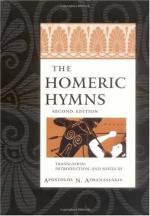Backward then they sailed towards the Dawn and the sun, and the Prince was their guide, Apollo, son of Zeus. Then came they to far-seen Crisa, the land of vines, into the haven, while the sea-faring ship beached herself on the shingle. Then from the ship leaped the Prince, far-darting Apollo, like a star at high noon, while the gledes of fire flew from him, and the splendour flashed to the heavens. Into his inmost Holy Place he went through the precious tripods, and in the midst he kindled a flame showering forth his shafts, and the splendour filled all Crisa, {127} and the wives of the Crisaeans, and their fair-girdled daughters raised a wail at the rushing flight of Phoebus, for great fear fell upon all. Thence again to the galley he set forth and flew, fleet as a thought, in shape a man lusty and strong, in his first youth, his locks swathing his wide shoulders. Anon he spake to the seamen winged words:
“Strangers, who are ye, whence sail ye the wet ways? Is it after merchandise, or do ye wander at adventure, over the salt sea, as sea-robbers use, that roam staking their own lives, and bearing bane to men of strange speech? Why sit ye thus adread, not faring forth on the land, nor slackening the gear of your black ship? Sure this is the wont of toilsome mariners, when they come from the deep to the land in their black ship, foredone with labour, and anon a longing for sweet food seizes their hearts.”
So spake he, and put courage in their breasts, and the leader of the Cretans answered him, saying:
“Stranger, behold thou art no whit like unto mortal men in shape or growth, but art a peer of the Immortals, wherefore all hail, and grace be thine, and all good things at the hands of the Gods. Tell me then truly that I may know indeed, what people is this, what land, what mortals dwell here? Surely with our thoughts set on another goal we sailed the great sea to Pylos from Crete, whence we boast our lineage; but now it is hither that we have come, maugre our wills, with our galley—another path and other ways—we longing to return, but some God has led us all unwilling to this place.”




